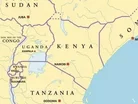EAC states’ refusal to open borders is affecting trade

Countries within the East African Community (EAC) are reluctant to open their borders, which subsequently is hurting trade and local manufacturers.
According to Jim Kabeho , the Acting Chairman of the East African Business Council, partial harmonisation of trade rules of the included states is damaging expansion in regional trade.
The six EAC states include; Republic of Burundi, Kenya, Rwanda, Uganda, and the Republic of Tanzania.
Some of the mentioned countries are continuing to implement non-tariff barriers at official borders, which can include refusal to recognise a certificate of origin.
Kenya and Tanzania have continued to disagree on certificates at the Namanga border.
SEE ALSO:
-
The expense of transport in COMESA is hindering Free Trade Area
-
Read the latest issue of Business Chief, Africa edition, here
To prevent this, the Common Market Protocol was enforced in 1 July 2010, more than 10 years ago.
The protocol was introduced in order to allow the free movement of goods, people, labour, services, and capital within the EAC countries.
“There are many positions we (EAC) have agreed upon which are not being implemented. Individual countries do not want to give away their authority to the common market,” Mr Kabeho reported.
“We do not have a common market per se as far as I am seeing in trade. We still have official borders being non-tariff barriers.”
- Siemens and Microsoft: Driving cross-industry AI adoptionDigital Strategy
- Lifetime of Achievement: Sir Jim RatcliffeLeadership & Strategy
- Trigo Group continues to expand operations across EuropeLeadership & Strategy
- From simulation to reality: Five key considerations for CIOsLeadership & Strategy
Featured Articles
SAP has announced it has appointed a new President for a newly-created EMEA region, aiming to make the most of the opportunities of cloud and AI technology
Technology giant SAP has expanded its portfolio with the acquisition of LeanIX, a leader in enterprise architecture management (EAM) software
To help businesses achieve increased productivity, Siemens and Microsoft are deepening their partnership by showcasing the benefits of generative AI

